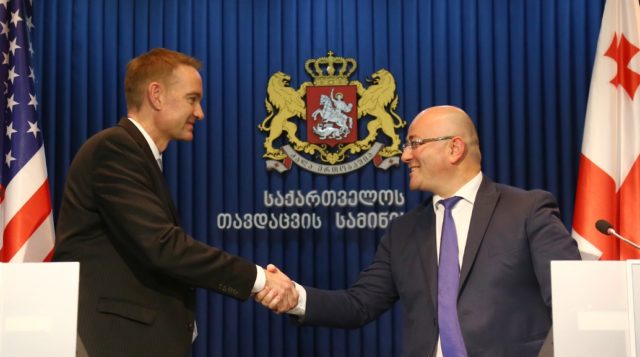
US–Georgia Defense and Security Cooperation Moves to a New Stage
Publication: Eurasia Daily Monitor Volume: 13 Issue: 195
By:

On December 6, Georgian Defense Minister Levan Izoria and US Deputy Assistant Secretary of Defense Michael Carpenter signed a framework agreement on security cooperation for 2016–2019 that will promote further development of the Georgian defense system. After signing the agreement, Georgia’s Ministry of Defense stated that the document “outlines long-term tasks of bilateral cooperation, synchronizes planning of priorities and resources and promotes the development of resolute defense capabilities” (civil.ge, December 6).
The spokesperson for the Georgian defense ministry did not provide details of the agreement during the conversation with journalists but noted that the treaty contributes to “strengthening the defense capabilities of the Georgian armed forces; establishing effective and sustainable defense systems; enhancing interoperability of Georgian troops with NATO, ensuring professional and effective military governance.” Besides, according to the Georgian defense agency, the framework agreement “will be revised and updated annually in the framework of bilateral top level consultations.” (civil.ge, December 6) Levan Jishkariani, an expert with the news analysis agency Factum, told Jamestown that this formula “means the US and Georgia intend to discuss changes in their cooperation plans in the light of emerging threats to Georgian security” (Author’s interview, December 8).
During the meeting with Michael Carpenter, Prime Minister Giorgi Kvirikashvili stated that US–Georgia defense and security cooperation has moved to a new stage. The prime minister’s press service said that Carpenter thanked Kvirikashvili for Georgia’s contribution to global peace and security (civil.ge, December 6). The editor-in-chief of the military analysis magazine Arsenali, Irakly Aladashvili, told the author that the “high-ranking representative of the Pentagon apparently meant that about 700 Georgian servicemen are stationed in Afghanistan. During the previous years, 1,650 Georgian soldiers and officers took part in NATO’s operations in Afghanistan. About 30 of them died and over 100 received injuries in combat.” According to Aladashvili, the US official confirmed that Georgia’s participation in the operations ISAF, Enduring Freedom, and Resolute Support Mission has been important to the American partners and Washington is paying Tbilisi back with increased attention through cooperation with Georgia” (Author’s interview, December 8).
Prime Minister Kvirikashvili said that defense and security assistance provided to Georgia by the US was “crucial.” He highly commended the National Defense Authorization Act for fiscal year 2017 that was approved by the US House of Representatives on December 2. The document refers to Georgia as “a valued friend of the United States” (civil.ge, December 6). “Georgia has repeatedly demonstrated its commitment to advancing the mutual interests of both countries, including the deployment of Georgian forces as part of the NATO-led International Security Assistance Force (ISAF) in Afghanistan and the Multi-National Force in Iraq,” says the National Defense Authorization Act. According to the press service of the Georgian government, Kvirikashvili especially emphasized the point of the act that “reaffirms US support for Georgia’s sovereignty and territorial integrity within its internationally-recognized borders, and does not recognize the independence of Georgia’s regions of Abkhazia and South Ossetia, currently occupied by the Russian Federation; and supports continued cooperation between the US and Georgia and the efforts of the Government of Georgia to ensure the security of its people and sovereign territory” (civil.ge, December 6).
The meeting of Georgia’s President Giorgy Margvelashvili and Michael Carpenter focused on the importance of the new Georgia Readiness Program, implementation of which will begin in early 2017. They stressed that the program is especially important for strengthening Georgian defense capabilities and sustainability, as well as regional security, according to the Georgian President’s office (civil.ge, December 6).
According to GHN news agency’s analyst, Nika Imnaishvili, the documents signed during Carpenter’s visit were an implementation and extension of the memorandum on “deepening the defense and security partnership,” which was signed on July 6 during the visit by US Secretary of State, John Kerry to Georgia (civil.ge, July 6).
The former adviser of the Georgian envoy to NATO, Vakhtang Maisaia, said that Washington was consistently developing cooperation with Georgia in the military sphere, but it was still unclear whether Georgia would be able to take advantage of the bilateral memorandum to buy weapons from the US. “The US leadership does not rule out or forbid such a possibility, but whether the Georgian army will be able to receive defensive weapons from the US depends on many factors” (Author’s interview, December 8). Maisaia said that Georgia, Ukraine, and other post-Soviet states could expect to receive significant financial aid from the US to improve their security. The US Congress has passed the corresponding bill S.2277, the Russian Aggression Prevention Act of 2014. “Several billions of dollars are at stake. Of course, Ukraine will receive most of the money, but Georgia might also receive substantial financial aid as well. Much will depend on the positions of the current administration of President Obama and the incoming Trump Administration,” Maisaia said (Author’s interview, December 8).
Moscow is taking the latest developments in the Georgia–US military cooperation quite seriously. Shortly before Michael Carpenter’s visit to Tbilisi, the Russian military launched large-scale military exercises in the occupied South Ossetia region. Over 1,500 servicemen, 500 units of heavy military equipment, and self-propelled artillery units were engaged in the activities. The exercises took place within several kilometers from the strategic highway Tbilisi-Gori-Kutaisi-Poti, which connects Georgia, Armenia and Azerbaijan to the Black Sea ports of Poti and Batumi. The location of the exercises is also only 40 kilometers from Tbilisi. The Georgian capital is within shooting range of Russian self-propelled artillery units that are deployed at the exercise location (apsny.ge, December 5).



